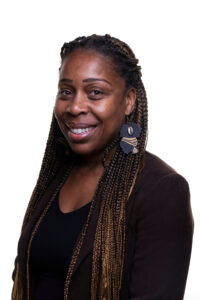Paulette Johnson is a social work academic and The Open University’s academic Lead for Access Participation and Success. Here she shares how the OU is tackling inclusivity within the sector from the inside out.
As a former practising social worker, now academic helping to shape the lives of social-work students, I’ve spent 20 years gaining an in-depth knowledge of the student-study journey in this sector.

Paulette Johnson
My current research is looking at anti-racist pedagogy, anti-racist curriculum, anti-racist practice and to explore how this is applied within a distance-learning institution.
Social work is crucial to society and it’s my focus and should be the sector’s focus to make it as inclusive as possible.
Better conditions for change
The field of social work continues to embrace anti-racist practice but academic institutions could create better conditions for change.
My research focus is on how well we prepare our students for today’s workforce, and I am particularly interested in how well we equip them to work with and respond to the needs of a diverse society.
This aligns with the global perspective of social work and the direction as outlined by the International Federation of Social Workers.
It’s more important than ever for institutions to develop relevant ways of working that enable anti-racist curriculum . In sharing our experiences we hope to assist.
We partner with employers to deliver a flexible, work-based route into social work across all four nations.
Flexibility widens the talent pool
The key benefits are that flexibility widens the talent pool and opens up reskilling and upskilling opportunities to people of all ages with the learning fitting around the job role, family commitments etc.
There are a number of different programmes and routes depending on the nation. The degree apprenticeship is in England only and only for undergraduates (but there’s a non-apprenticeship postgraduate route too).
It’s not just about attracting the right students but improving the experiences and outcomes for marginalised, under-represented and minoritised groups of students, as well as ensuring that all are enabled to reach their full potential.
That’s why we look to our students from Black, Asian and minority ethnic backgrounds to gain their feedback on their student journey so that it constantly evolves.
Relevant life experience is valuable
Social workers are often on the front line dealing with some of the most deprived communities so we talk to our students to include in the curriculum any relevant life experience they may have. Our work has included:
- Inclusive curriculum tool: Who better to tell us how to shape the curriculum than those who use it – our students? The OU developed an Inclusive Curriculum Tool to be used in reviewing new and existing curriculum content and the latest version was launched in January 2022.
Students undertook paid roles to co-produce curriculum and input into curriculum reviews. Evidence tells us that students seeing themselves represented in the curriculum is one of many ways to foster student belonging. - Admission process research: We’ve undertaken research into our admissions process to better understand the experiences of our Black, Asian and minority ethnic students embarking on a social work degree at the OU.
It has resulted in a better understanding of the experiences of those students embarking on this qualification with us. - Peer-mentoring: We’ve embarked upon peer-mentoring programmes for students across the faculty and we have evidence of its ability to provide additional support to our student group and an opportunity for existing students to develop their skills.
- Digital inclusion: This is an issue that has the potential to affect many students who wish to access a distance-learning environment such as the OU.
Given the current cost-of-living crisis across the UK, many are impacted by this and we feel it’s imperative for us to understand how digital exclusion affects our students and our potential students. - Tapping into existing expertise: Making the curriculum inclusive and anti-racist requires resources and expertise. In reviewing the practices, we are drawing on the experience of our colleagues who have specific expertise in this area, students, including those who come with rich expert-lived experience, and we are looking at ways to upskill the whole teaching community and our student group. The Union Black free course, Developed by Santander Universities in partnership with The Open University, is available to all students and academics.
There is always room for improvement and it is worth institutions looking in the mirror and assessing where we can be more intentional in our efforts to make positive change.. Academic Institutions need to look at whether they are creating the best conditions for change.



